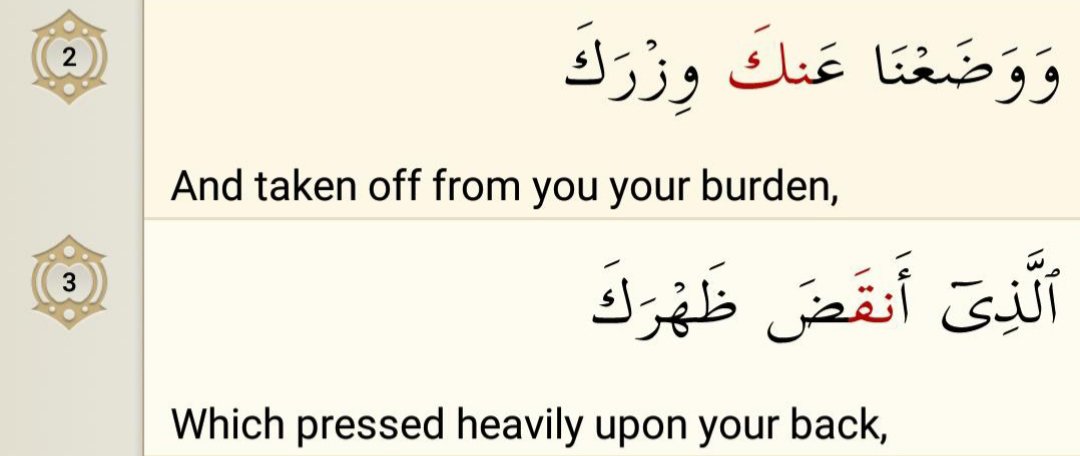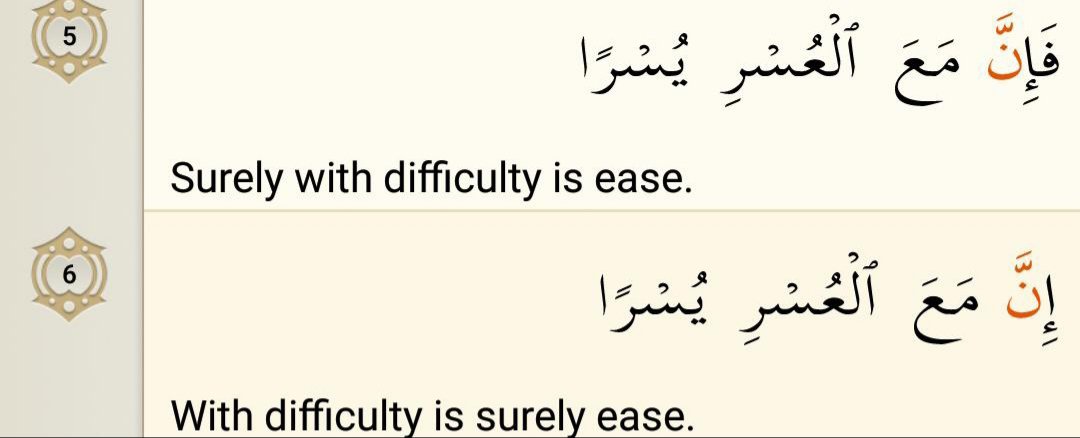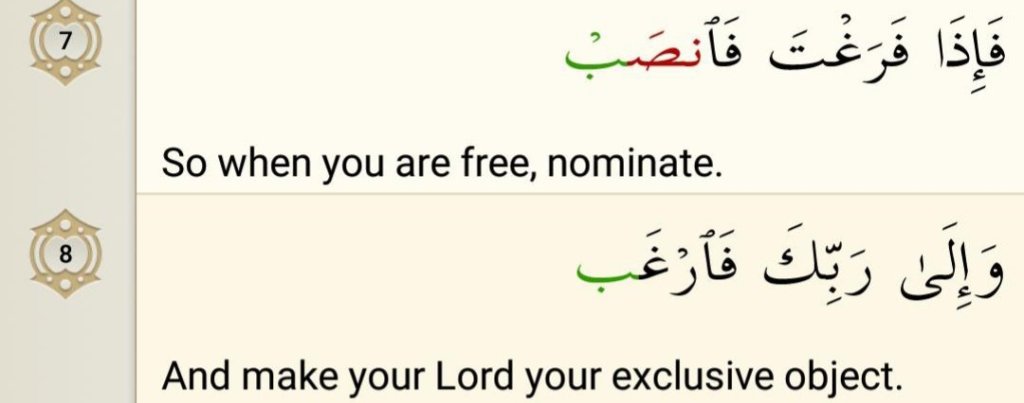
Surah Al-Inshirah is a Meccan surah with eight verses. Al-Inshirah means The Opening Up. The Surah is so designated after the first sentence.
Its subject matter so closely resembles that of Surah Ad-Duha that both these Surah seem to have been revealed in about the same period under similar conditions. It was sent down in Makkah just after Surah Ad-Duha, and serves as the consolation of Prophet pbuh.
The aim and object of this Surah is to console and encourage the Messenger pbuh. Before his call he never had to encounter the conditions which he suddenly had to encounter after it when he embarked on his mission of inviting the people to Islam. This was by itself a great revolution in his own life of which he had no idea in his life before Prophethood. No sooner had he started preaching the message of Islam than the same society which had esteemed him with unique honor, turned hostile to him. The same relatives and friends, the same clansmen and neighbours, who used to treat him with the highest respect, began to shower him with abuse and insult. No one in Makkah was prepared to listen to him; he began to be ridiculed and mocked in the street and on the road; and at every step he had to face new difficulties.
Although gradually he became accustomed to the hardships, even much severer ones, yet the initial stage was very discouraging for him. That is why first Surah Ad-Duha was sent down to console him, and then this Surah.

The Prophet pbuh in the initial stages of calling people to Islam, was very disturbed & distressed at the great hardships that he was passing through. Under those conditions Allah addressed him and consoled him: “O Prophet, have We not blessed you with such and such favor? Then, why do you feel so disturbed and distressed at these initial difficulties?” And the foremost favors Allah states in this very first verse is Sharh-Sadr– the opening of the chest!
What is Sharh-Sadr?
➖Sharh sadr means to free oneself from every kind of distraction and to be satisfied with Islam as the only right way of life, and to regard the beliefs, principles of morality & civilization, religious instructions & injunctions, which Islam has given to man, as right and true!
➖Sharh sadr means a person’s finding it too hard for himself to shoulder the onerous responsibilities of Prophethood and going out to clash with a mighty and tyrannical power of disbelief all by himself, and sharh sadr implies that his morale be boosted so that he is ready to undertake any campaign and any task however difficult and hard, without any hesitation, and he develops the nerve and courage to shoulder the great responsibilities of Prophethood.
So the opening up of the Prophet’s chest contains both these meanings. According to the first meaning, it implied that before the Prophethood the Prophet pbuh looked upon the religion of the polytheistic Arabs, Christians, Jews and fire worshipers as false, and was not even satisfied with the Arab monotheists, for it was an ambiguous creed which contained no detail of the right way. But since he himself did not know what was the right way, he was mentally confused and distracted. With the blessing of Prophethood Allah removed his mental agitation and opened up before him the way of right guidance, which brought him full peace of mind.
According to the second meaning, it implies that along with the blessing of Prophethood Allah also blessed him with the courage, spirit ,of resolution and broad mindedness which were needed for shouldering the onerous responsibilities of the great mission. He became bearer of the vast knowledge, which no other human mind could encompass and contain. He was blessed with the wisdom which could rectify any evil however grave and wide spread. He developed the capability to stand up without any equipment and the apparent help and support of a worldly power as the standard-bearer of Islam in a society sunk in ignorance and barbarism, to brave any storm of hostility without the least hesitation, to endure patiently all the difficulties and hardships of the way so that no power might cause him to abandon his position and standpoint.
Thus, the verse means: “When Allah has blessed you, O Prophet, with this invaluable wealth of sharh sadr, why do you feel distressed and depressed at the hardships you are experiencing in the initial stage of your mission.”


Now Allah mentions the second favor. Here vizr means a heavy burden and it implies the burden of distress, anguish and anxiety which the Prophet pbuh experienced, and which was burdening his sensitive nature when he saw his nation deeply sunk in ignorance & barbarism. Idols were being worshiped, the community was engrossed in idolatry and polytheistic customs, filth of immorality and indecency prevailed all around, wickedness and corrupt practices of society, the powerful were suppressing the powerless, girls were being buried alive, tribes were subjecting one another to surprise attacks, and sometimes the wars of vengeance continued for a hundred years at a stretch. No one’s life, property and honor was safe unless he had a strong hand at his back.
This all grieved the Prophet pbuh but he could find no way to cure the malady. This same anxiety was weighing down his back. Allah by showing him the way to Guidance removed its burden from him. Then as soon as he was appointed to Prophethood, he came to know that belief in the doctrine of Tawheed, the Hereafter and Prophethood was the master-key by which each corruption in human life could be eradicated and the way to reform opened in every aspect of life. This guidance from Allah relieved him of his burden and he felt re-assured that by means of it he would not only be able to cure the maladies of Arabia but also of all mankind outside Arabia as well.


Now Allah mentions the favor of elevation of the mention of the Prophet pbuh. This was said at a time when no one could even imagine how the renown of the one unique individual who had only a few followers confined only to the city of Makkah, would be exalted throughout the world, and what high fame he would achieve. But Allah Almighty gave His Messenger pbuh this good news under those very conditions and then fulfilled it in a strange way.
In the first place, he took from his enemies themselves the task of exalting his renown. One of the methods that the disbelievers of Makkah adopted to defeat his mission was that in the Hajj season when the pilgrims from every corner of Arabia came to Makkah, they would warn them to beware of a dangerous man called Muhammad (pbuh), and accused him of magician. In this way although they were trying to defame the Prophet pbuh, yet the result was that his name reached every comer of Arabia and the enemies themselves took him out of his seclusion in Makkah and introduced him among all the tribes of the country. The people became curious to know as to who was this man, what he preached, what was his character like and who were the people influenced by his magic and what sort of effect his “magic” had on them. As the propaganda of the Makkan disbelievers spread the people’s curiosity also grew. When as a result of this the people got to know the truth and were inspired.
After Hijrah to Madina, his name became more renowned and then after with the establishment of the righteous Caliphate when his holy name started being mentioned and praised everywhere in the world. This process continues till today, and will continue till Resurrection if Allah so wills.
Wherever in the world there exists a settlement of the Muslims, the apostleship of Muhammad pbuh is being proclaimed aloud in the call to the Prayer five times a day, blessings of Allah are being invoked on him in the Prayers, and his sacred remembrance is being made in the Friday Sermons. There is no moment in the 12 months of the year and in the 24 hours of the day when at one or another place in the world, the Prophet’s holy name is not being mentioned. This is a clear proof of the truth of the Quran that when in the initial stage of the Prophet hood Allah proclaimed wa rafa `na Iaka dhikrak, no one could estimate and imagine with what esteem and to what great extent the Holy Prophet’s renown would be exalted.


After listing his favours Allah now gives consolation to the Prophet pbuh. The word usr is either a difficulty or a difficult time. Yusr in contrast is something easy such as a task that requires no effort. It indicates as a single difficulty with multiple eases. So, with every difficulty there will be amazing ease and this ease is far greater than the difficulty. This has been repeated twice so as to reassure the Prophet pbuh that the bad times he was passing through at that time would not last for ever, but were going to be replaced by good times in the near future.
The verse means O Prophet! Do not grieve for the difficulties and troubles. They will convert to ease and comfort. The impediments of the enemies do not last too long, and the trials and difficulties will be over soon. He who suffers the hardships and stands against the storms of miseries with patience will surely taste the sweetness of its fruit.
The rule is general and for all. It encourages the pure believers to know and be sure that whatever difficulties or troubles are encountered by men, Allah always provides a solution a way out, a relief, a way to lead to ease and happiness. Moreover, the solution or relief does not merely come AFTER the ‘difficulty’ it is provided WITH it.
It is the glad tidings or promise of Allah that enlightens the heart, makes it hopeful for triumph, and clears Man’s soul of the dirt of its hopelessness.
The Prophet pbuh said:
“Do know that surely with hardship comes ease, and surely with patience comes victory, and surely with distress comes relief.”


The Prophet pbuh would spend the entire day giving dawah to the people but would much rather have been in a conversation with Allah. So, Allah tells him that when he has finished (faraghta) his work of dawah in the day, he can do what he has wanted to do all day. The word nasaba in Arabic means to be pegged and also means to be exhausted and so Allah is telling the Messenger pbuh to stand up and exhaust himself, which refers to Qiyam-ul-Layl. Think of our Salah compared to the Salah of the Prophet pbuh who would be desperate to pray to the point that his feet swelled up. The day activity of the Prophet pbuh is dawah whilst qiyam is his night activity. People take a holiday so that they can return to their work energised. Allah is telling the Prophet pbuh that his job will never be done and that when he is free from one task he should exhaust himself in the next task, as there is no such thing as a free moment for him but he should also know that there is tremendous ease eventually coming his way. The Prophet pbuh must continuously remain dedicated to Allah and even in his sleep the Prophet pbuh is doing dhikr – that is his status.
The word raghiba means to lovingly devote yourself to someone. Allah is telling the Messenger pbuh that he should be completely and lovingly devote to his Master. Allah tells the Prophet pbuh to cut off from humanity and turn to Him. The whole life of the Prophet pbuh was dedicated to bringing victory to Allah’s Deen, to cleanse the house of Allah and to establish His law. But when he is done with his major duties, he should fully turn to Allah and that’s the energizing point of his being. This also gives us message of how to be balanced between task of Dawah and Zikr.
